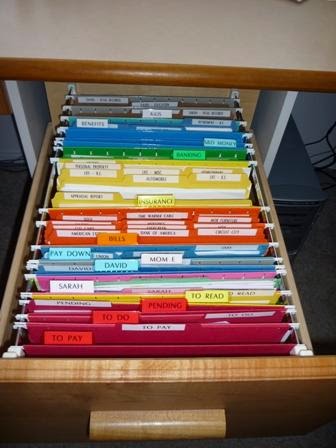 |
| From: The Container Store |
This is where some people get bogged down. They look at all of the paper and think: " You mean I have to go through all of this @#$% (expletive deleted) paper??" The bad news is, yes, you do. The good news: you only have to do it ONE PIECE AT A TIME.
If you're easily distracted by that big pile of
 |
| Source |
sorted. This tricks your mind into thinking you only have a little to do, and it's not as overwhelming. Sometimes, clients work well when I hold the stack in my lap under the table and hand it to them one piece at a time. (tip: maybe you can bribe one of the kids or a friend to do this for you).
STEP ONE: SORT BY YEAR
Put the papers in stacks by year, pull out any permanent or current documents such as birth certificates, mortgage documents, life insurance info, and so on. The rest of the papers can be put in a folder, label with the year, and stored in a portable file box somewhere out of the way or in a file cabinet.
 STEP TWO: SORT THIS YEAR
STEP TWO: SORT THIS YEARYou'll find that the paper naturally lends itself to different broad categories; things like: monthly bills, financial statements, house/mortgage, auto. It's not important how you label and arrange the files, but it is important that it makes sense to you, so you can find things when you need them.
The broad categories are your hanging files, and file folders are subcategories. For example: The hanging file is labeled Auto. The folders inside could be: Insurance, Registration, Repairs/Services. Or, if you have more than one vehicle, the papers could be sorted by vehicle, as: Porsche, Ferrari, Jaguar.
If you're a visual person (or if you just want to impress yourself and others with your organizing skills), you can use colors for different categories.
For many monthly statements that are not tax deductible, you can toss or shred the last statement, and keep only the current one. (More information about creating home filing systems: here.)
Step 3: Put the files away.
Files that you are currently using should be easily accessable. You won't use them if they're difficult to get to! Some people need to have these files clearly visible, out on a shelf or counter and in an open crate, a filing cabinet is fine for the rest of us.
Step 4: Use online banking services if you're not already doing so. I was a late-comer to this, but once I started, I was amazed at how much more quickly and easily I was able to complete the task. Some people have security concerns about paying online, but in my opinion you're just as safe--if not safer--than when you put a piece of paper with your checking account number in the mail. Just make sure you have a good password.
Congratulations! Taking control of the paper monster is a HUGE step towards creating order in your life. Remember, if you need help at any stage of the project, you can always call on your friendly home organizer to give you a helping hand and a high five when you've finished!
Resources for finding an organizer:
National Association of Professional Organizers (NAPO)
NAPO Wisconsin , click on "Find an Organizer"
Also: Find My Organizer
 |
| source |
For solutions to your organizing challenges,
to schedule a free consultation,
or have a conversation about your organizing needs:
at Create Order
Home Organizing and De-materializing Service
"Say YES to less"
"Say YES to less"
No comments:
Post a Comment